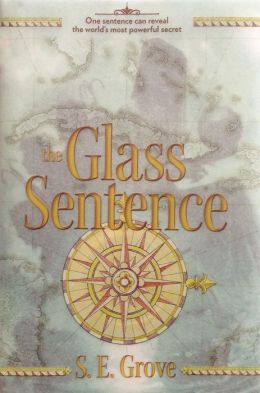The Glass Sentence, by S.E. Grove
Jul 28
2014

Several people have compared S. E. Grove's debut novel The Glass Sentence to Philip Pullman's The Golden Compass. I understand the comparison, but, uh, like hell: Grove is a promising writer, but she doesn't have Pullman's skill (at least, not yet). Instead, I was put in mind of a child-friendly version of Susanna Clarke's Jonathan Strange and Mr Norrell—a truly impressive effort, but one where the author's interest in writing something entertaining was sometimes overshadowed by her burning desire to produce a Great Book.
The Glass Sentence is set in a world where time is geographical. After the Great Disruption of 1799, the planet has splintered into countless different Ages—Papal States, Prehistoric Snows, and futuristic societies suddenly exist simultaneously. 13-year-old Sophia Tims has been raised in 19th century Boston as the ward of her uncle, a famous cartographer. When Boston's elite decide to close their borders, Sophia and her uncle make a desperate plan to go in search of her long-lost parents, but before they can leave Sophia's uncle is kidnapped, entangling them both in a madwoman's plot to re-alter time.
While the scope of this novel is dazzling, Grove's characters are considerably less so. Sophia is helped by several people who seem to exist mostly to solve whatever problem is besetting her at the moment, and storylines that should have been interesting (a tragic romance between two of the adult characters, for example) go absolutely nowhere. No one is unlikeable; they're just... flat. The villain is the most dynamic character of the bunch, but she isn't around enough to carry the entire book.
That being said, I don't want anyone to think The Glass Sentence isn't worth reading, because it is. It's challenging, thoughtful, and dynamic, and Grove clearly has plenty of respect for for young readers' patience and intelligence (seeing as her book clocks in at 500+ pages). I'm just hoping that as she gains experience, she'll find a way to make her characters as interesting as her setting.
The Glass Sentence is set in a world where time is geographical. After the Great Disruption of 1799, the planet has splintered into countless different Ages—Papal States, Prehistoric Snows, and futuristic societies suddenly exist simultaneously. 13-year-old Sophia Tims has been raised in 19th century Boston as the ward of her uncle, a famous cartographer. When Boston's elite decide to close their borders, Sophia and her uncle make a desperate plan to go in search of her long-lost parents, but before they can leave Sophia's uncle is kidnapped, entangling them both in a madwoman's plot to re-alter time.
While the scope of this novel is dazzling, Grove's characters are considerably less so. Sophia is helped by several people who seem to exist mostly to solve whatever problem is besetting her at the moment, and storylines that should have been interesting (a tragic romance between two of the adult characters, for example) go absolutely nowhere. No one is unlikeable; they're just... flat. The villain is the most dynamic character of the bunch, but she isn't around enough to carry the entire book.
That being said, I don't want anyone to think The Glass Sentence isn't worth reading, because it is. It's challenging, thoughtful, and dynamic, and Grove clearly has plenty of respect for for young readers' patience and intelligence (seeing as her book clocks in at 500+ pages). I'm just hoping that as she gains experience, she'll find a way to make her characters as interesting as her setting.
Posted by: Julianka
No new comments are allowed on this post.
Comments
No comments yet. Be the first!